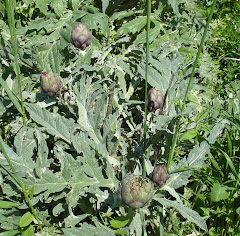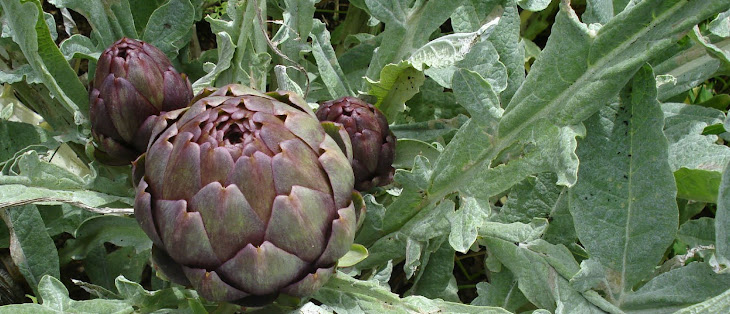For the past few days, since I read Kate's post on responsibility for the planet on the Hills and Plains Seedsavers blog, I've been thinking about my own list. I believe that we should all have such a list, but that this doesn't absolve governments from responsibility. Individuals cannot save the planet - governments have to do something too. However, in spite of the occasional hopeful sign, politicians are failing the planet, so we have to do what we can while we try to persuade them to do their bit too.
Pendant ces derniers jours, depuis que je lis le poste de Kate au sujet de la responsibilité pour la planète, je pensais de ma propre liste. Je crois que tout le monde doit avoir une liste, mais il faut aussi que les gouvernements prennent la responsibilité. Les individus ne peuvent pas sauver la planète. Cependant, malgré des signes d'espoir de temps en temps, les politiciens manquent à leurs devoirs envers à la planète. Donc on doit faire ce qu'on doit pendant que nous essayons de les persuader.
This is the list of ways in which Lo Jardinièr and I think we can take responsibility for our lives and the future of the planet:
1. Growing our own food / cultiver le potager

We grow almost all the vegetables we eat, almost all year. This is mainly because we enjoy gardening and because they taste better. (I wrote about this in August.) But it also saves on transporting food by road, or even worse by air. We cook all our food - we hardly ever buy anything ready prepared.
On cultive le potager parce qu'on aime jardiner et les légumes ont plus de gout. (Voir mon poste en août.) Mais aussi ça utilise moins de ressources du monde.
2. Buying local, buying sustainably, recycling / acheter localement, durablement, et renouvelablement
Almost all the food we eat comes from within 100 km of the village, although we do buy fruit from Spain and North Africa When we eat meat, it is usually pork, poultry or lamb, which are sustainable, rather than beef which is not. As far as consumer durables are concerned we're lucky to have reached the stage in our lives when we have furnished our house, so we don't buy much. We also keep using these items while they are still working, rather than throwing them out for the latest fashion - for example our oven which is old and ugly, but it works, so we're keeping it. On the rare occasions when we take things to the dump we pick up building materials that others have thrown out. We're hoping to find wood for a cold frame there and will buy old windows for it from Emmaus, a recycling charity.
On mange les produits qui viennent de moins de 100 km du village, a part des fruits de l'Espagne et de l'Afrique du Nord. On mange le porc, la volaille et l'agneau. On continue d'utiliser les machines qui marchent toujours.
3. Minimal packaging / emballage minimal

Because what we do buy comes from local shops and markets, there is very little packaging. Anything we buy in the market goes straight into our wicker basket and we refuse offers of plastic bags. Cheese and meat from the local shop are wrapped in paper, and vegetables are put in paper bags which we re-use to collect food from the garden.
Car ce qu'on achète vient des magasins locaux et le marché, il y a très peu d'emballage. On refuse les poches en plastique.
4. Share and exchange / partager et échanger
One of the nice aspects of living in a village is having a community of people nearby with whom we can exchange and share. Just a couple of examples: Friends give us fruit, we make jam with it and then give them back some jars of jam in return. We've bought a second-hand trailer to share with our neighbour, since neither of us need to use it every day.
On partage et échange avec les autres habitants du village.
5. No air-conditioning / on refuse la climatisation
The units look ugly on the outside of lovely old village houses, the air quality they produce is unnatural and in cars air-conditioning uses extra fuel. In summer we shut the shutters in the afternoons to keep the heat out. In the car we open the windows.
En été on ferme les volets l'après-midi. Dans la voiture on ouvre les fenêtres.
6. We don't fly / on refuse de voyager en avion
We never fly. This isn't a choice that everyone can make, we know. But when we go on holiday we go by train. And we enjoy it!
On voyage en train, et on l'aime!
7. A few (unsustainable) luxuries / quelques luxes non-durables

Italian coffee - roasted in Italy, grown in South America or Africa. Very occasionally, we eat steak. And because I can't walk up hills easily, we go by car to the garden.
Le café italien. Le steak, de temps en temps. Aller en voiture au jardin.
This list isn't complete, but it's a start. Everyone has to make their own choices for their own lists. This is ours. What's yours?

























































